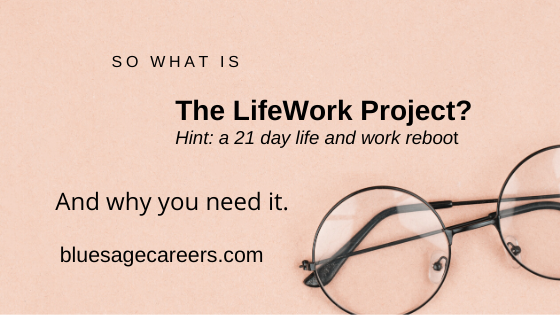5 Myths about Job Hunting During a Recession
/Photo by Andrew Winker on Unsplash
The economic numbers are scary. According to the Associated Press, “the U.S. unemployment rate hit 14.7% in April, the highest rate since the Great Depression, and 20.5 million jobs vanished in the worst monthly loss on record. The figures are stark evidence of the damage the coronavirus has done to a now-shattered economy.”
I’m hearing from people who have been furloughed or laid off, from self-employed workers who are finding their income streams drying up or disappearing, and from others who worry that lay-offs are just around the corner. These worries are keeping people up at night, imagining the worst, that the recession will deepen into even darker economic times and jobs will be hard to find.
While it’s normal to worry about the future, especially when times are difficult, it’s important to know that, while job hunting during a recession is not an easy task, it’s not impossible.
Yes. A lot of people are out of work and looking for job.
Yes. There will be a lot of resumes submitted for every position.
Yes. That’s a lot of competition so you’ll need to work extra hard to prove yourself to be a great candidate.
But there is good news out there. Here are five myths about job hunting during difficult economic times.
Myth 1: No one hires during a recession.
The truth is businesses are always hiring. I’ve talked to two hiring managers recently who are in the process of reviewing resumes to fill open positions.
Some businesses will be hit hard and will reduce staff, perhaps temporarily freeze hiring or simply wait a few months to re-open positions. But, for others, there will be a need to replace employees who have moved on, moved up, or retired.
It’s hard - but not impossible
While this lockdown is a little different than most recessions, some companies are seeing their businesses boom. Companies that specialize in online or remote services, such as tech companies or companies that produce at-home alternatives to traditional services - such as home exercise equipment - are experiencing huge demand right now. Companies that support online shopping, teleconferencing, and telework are also expanding. And there are others that are still running full speed ahead. Not every industry has been affected in the same way.
However, competition for jobs will be tough. You’ll need to have a spot-on resume and cover letter, develop and use your professional network, and possibly upgrade your skills by taking an online course.
Myth 2: If you're over 50, you won't get hired
Not going to lie, it’s harder to get hired once you reach a certain big 0 birthday. Age discrimination, more accurately called experience discrimination, is a real thing. People over 50 have to compete with younger workers who make up over half the work force. These millennials can be highly skilled, tech savvy digital natives, and a whole lot cheaper to hire.
Again, this just means you have to work harder. One of the benefits of being a worker who’s been around for a few years is that you often have a much larger network. Use it! You also need to be very clear on your skills and specialties and market those well. It never hurts to to upskill and improve your tech skills by taking online courses (preferable ones with a certification.)
Myth 3: No one will hire you after you’ve been laid off.
Right now, layoffs are a fact of life. Employers understand that. Layoffs are common during a recession.
However, this fact means that there are more people in the job market looking for work. Again, it means the competition will be tough and you need to be ready.
You may need to shift industries if your particular field took a real hit in this economic downturn. There’s no shame or penalty in working outside your field. In fact, it may make you more valuable in several ways. You will find a new perspective on your work, build your network, and gain transferable skills. You might enjoy it so much it becomes permanent.
Take a look around at the industries that are still hiring and see where your skills might transfer. Think of it as a new adventure!
Myth 4: You’ll have to settle for less.
Getting hired during an economic downturn doesn’t always mean taking a pay cut.
True, in some industries, you may need to prepare for lower starting salaries, however, recession or not, you need to be ready to negotiate your salary. That includes doing your research and having an idea of typical salaries for that position.
Be ready to prove why you’re worth the investment. Be ready to talk about the ways you would be a valuable asset to the company and how your unique skill set outshines the competition and makes you a great fit for the position.
Myth 5: Online job boards are the best place to find jobs.
While job boards are a great place to start in your job search, you can’t stop there. Even the best job search sites can’t beat good old fashioned networking. In-person networking, even if it’s virtual, is crucial for getting hired. It’s often called the hidden job market. Some positions are never posted online or advertised - they are filled by someone who knew someone who was right for the job.
Just sending out resumes and waiting for the phone to ring won’t land you a job. Get out there and be aggressive in your job search. Make a list of everyone you know who might know someone and start contacting them. Update and polish your resume and send it to professional contacts, friends, family, your hair stylist. You never know who will happen to know someone who can put you in touch with a company that is hiring.
Blindly applying for a job online is rarely how you will land your next position.
The best advice is don’t give up! It’s going to be a bumpy ride for a while, but we will get through this. Some truths remain the same - even in a recession. Finding a good job takes hard work, marketing yourself well and networking, networking, networking.
Anita Flowers is a Board Certified career and life coach at Blue Sage Career Strategies. A little different than most life coaches, Anita’s background in clinical psychology and years of experience as a counselor gives her a rich understanding of human development and family dynamics. Her work history includes 13 years working with an international business company and 12 years doing individual and family counseling as well as career counseling. This blend of counseling and business experience gives Anita a unique perspective on the world of work and life. Anita works with people literally all over the world to help them discover a life and career they love. Contact Anita here to get started on your new career and life!


















